A reflection on wilderness places, and meditative prayer
Lydia says: It’s 1 hour and 20 minutes long, but I would encourage you to carve out some time to listen and rest and wonder about God’s love and provision in the wilderness places.

Lydia says: It’s 1 hour and 20 minutes long, but I would encourage you to carve out some time to listen and rest and wonder about God’s love and provision in the wilderness places.

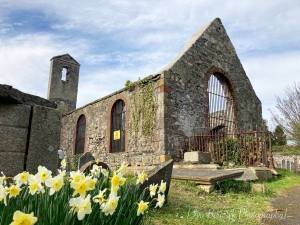
Service in St John the Baptist Clontarf for The Church’s Ministry of Healing: Ireland
Saturday May 21st 2022 3pm
Sermon preached by the archbishop Michael Jackson
“Jesus said again, Peace be with you! As the Father sent me, so I send you.” (John 20:21)
Today we gather for a Service of Thanksgiving and of Remembrance for the work of The Ministry of Healing, not only in this diocese but throughout the Church of Ireland. And we do so on the ninetieth anniversary of our foundation. In this thanksgiving, we remember those who on countless dark evenings and in countless small corners have prayed for the sick and for those who have asked for prayers for their healing. Only they know the distresses to which they are inviting God to respond.
Those same individual prayer-s have instinctively widened their prayer to pray for the needs of the world and its peoples – in the spirit of wholeness and healing together – and who would not wish to offer the embrace of God to the peoples of Ukraine and of Russia today and to all other peoples remembered and forgotten in similar plight the world over? God’s healing is boundless and only waiting to be invited to act. Who are: the sick? They are people who as individuals are known to other people as individuals. They are people for whom other people stop what they are otherwise doing in order to care, to remember before God and for whom they want to share their hope, whatever the future may hold. But you will go on to say: Hope for what? I reply: Hope for healing and what is more than that: healing that may or may not result in physical or mental or spiritual cure, but which always expresses itself in care. Healing and cure are not the same thing. But the assurance of Christian Healing constantly is that it will result in a closer walk with God among those who care for the one and the many who are sick and in need and for the myriad of individuals who have asked for care and prayer.
We rest in the Season of Easter. We read in the rapidly moving chapter 20 of St John’s Gospel of two particular types of healing. One involves no touch whatsoever, Mary of Magdala; one involves close touch and the invitation to dig deep more than once, Thomas the Twin. Both at the same time and in the same spiritual movement involve The Risen Lord, and that is the point; and that is why it is good to hold this service of thanksgiving in The Season of Easter. This is our point of connection. This is our focus of hope. This is our real presence of Christ Jesus the Healer risen and among us. Healing, in our context of embodied faith, always involves the holding together of the body of Christ and the body of humanity, Passion and Resurrection, Creator and creation. Jesus asks Mary to refrain from touching him; he is still in an in-between state and needs to be left to ascend. Jesus asks Thomas to touch him and to plunge his finger into the hole made by the soldier’s spear in his side, to look at his hands and to make a very particular connection of faith in the physical. We have no option but to go with the scriptural flow of contradiction. Spiritual healing involves both not-touching and touching. Both of these very vivid pictures in tandem take us to the heart of healing: what it is to be transformed, each of us differently, by meeting The Risen Lord Jesus who carries beyond the grave his experiences of our life and gives back again to us those experiences for our experiencing transfigured by Passion and Resurrection. In so doing, he transforms and heals our on-going life.
Recently, I was at a residential meeting to do with theology in the Four Anglican Provinces of these islands and one of the participants who had expected to be present was unable to do so because she had to take her husband to hospital to have a particular eye procedure and then needed to get him home and keep tabs on him. There was no pre-assured sense of how the procedure would go. It might not have worked. The procedure was successful and the participant who could not come to the meeting was able to join us by zoom from home. A devout person who is also a medical doctor who was present at the meeting said, totally unselfconsciously: Yes, Tom has received a miracle. In our generation, as in previous generations but now with a very particular urgency, an urgency of honesty, of credibility, of breath-taking advances in medical science and of lived experience, we need to face the active relationship between the spiritual and the medical: healing relates to both, science and spirit relate to one another. I found this a wonderful thing to hear when I heard it said at the conference. Many of the happenings that we and others have by custom described as miracles are carried out, both routinely and in emergencies, by medical personnel and by the advances in medical science. And such insights and appreciations are essential for our generation to speak out boldly in commending The Ministry of Healing with all of its integrity, all of its rich history and all of its human and divine hopefulness – and to make and to hold the connections between both with confidence and without embarrassment.
Before the Season of Easter passes us by completely, let us harness what it is to accompany, what it is to connect God with those who seek healing. Let us go further and let us offer ourselves as agents of healing to others. After all, this is our commissioning as disciples of Christ the Healer and the Teacher and the Giver of Life. I am not saying something trite, such as: Anyone can pray, anyone can heal. What I am saying is that, as children of the Resurrection, as people of gift and adventure, we need to want to take the peace that Christ Risen brings to his disciples then, as recorded in St John chapter 20, into the world now. When I worked in St Finbarre’s Cathedral in Cork, I remember going to visit a parishioner who had to have a cataract removed in the Cork University Hospital. This was a major outing for this lady and she faced it with fortitude and faith. While I sat with her, I simply let her tell her story. And I remember what she said: I will never forget what it was like when they pulled away the patch and I could see clearly the light once again. This faithful parishioner, with whom I celebrated Holy Communion monthly in her home in the flat of the city, had grasped the connection of light, miracle and medicine. God inhabits the totality of our world as its creator. God inhabits the totality of who we are and what we do. We have no need to collude with any stand-off between religion and science when it comes to healing. The Prayer Book speaks in a simple phrase of: patient continuance in welldoing … In its original context, it relates to Christian citizenship. We can give it voice in Christian healing as another expression of: patient continuance in welldoing … So many of those whose loves and instincts we celebrate today have done just this without fuss or fanfare throughout their times of association with The Ministry of Healing. We are called and commissioned by our baptism to do the same.
In this church dedicated to St John the Baptizer, I give thanks with you for the Ministry of Healing and, in the words of The Collect for St John the Baptist’s Day, I encourage you as that prayer encourages everyone at the mid-point of the year, June 24th to take up this charge:
… after his example constantly speak the truth, boldly rebuke vice and patiently suffer for the truth’s sake. This is a truth of faith, a truth of hope, a truth of justice, a truth of healing that sets us free to continue to prepare the way of the Lord in our time and in our place.
“Then Jesus breathed on them, saying, Receive the Holy Spirit!” (John 20:22)
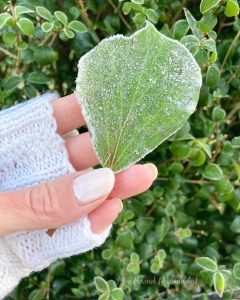
“I pray that, according to the riches of his glory, he may grant that you may be strengthened in your inner being with power through his Spirit, and that Christ may dwell in your hearts through faith, as you are being rooted and grounded in love.” (Ephesians 3:16-17)
These last two years of the pandemic have been hard for everyone. We have all had our own individual struggles, some more traumatic than others, but no one can say they were left unaffected. We are not the same people we were when the pandemic started. The journey of the last two years changed us, perhaps even significantly. Our relationship with God most likely changed as well.
We all pray differently; some of us love set prayers, or we like to read the Scripture. Others simply sit in silence before God. However we pray, it is important that whatever is happening in our loves is also part of our prayer, and that prayer informs our life. Like ebb and flow of the ocean’s waves on the shore. Especially when there are difficult experiences we are facing, and difficult emotions within us, it helps to bring them to God. Psalms are full of the words of anguish and anger as well as hope, faith and love. In the Gospels we see Jesus angry, crying at a death of his friend, as well as taking part at a wedding celebration. So do not be afraid to bring how you feel into your own prayer. I encourage you to be real with God.
What was your greatest struggle over the last year or two? Where was God in your life?
What blessings did you encounter?
It may be scary to answer some of these questions. Take time, and sit with your answers. Set time aside each day for private prayer, and let God support you through what you have been dealing with.
God wants to strengthen our inner being. And we all know we could use this strengthening.
Bring to God what is the most precious in your heart. Bring your desires, fears, hopes. In that sacred moment when you sit before God, let Him love you. Let Him pour out His affection into the innermost parts of your soul. Talk to Jesus, but also be silent in His presence and simply let Him show you His love.
“I pray that you may have the power to comprehend, with all the saints, what is the breadth and length and height and depth, and to know the love of Christ that surpasses knowledge, so that you may be filled with all the fullness of God.” (Ephesians 3:18-19)
© Dr. Iva Beranek

“The Lord is coming, always coming. When you have ears to hear and eyes to see, you will recognize him at any moment of your life. Life is Advent; life is recognizing the coming of the Lord.” Henri Nouwen
Advent is approaching. For some people it is a hectic time of the year, others love it.
What about you?
It is good to be intentional as the Advent season is at the door. Decorate your space, perhaps with Advent wreath. Every week light a new candle and ask God to bring more light into your life, into your heart.
Pray with Scripture. Take the Sunday Gospel & sit with it for 20-30 minutes. What stands out? Where is God speaking to you?
Gratitude helps us see the good that already is in our lives.
Have a fruitful Advent this year.
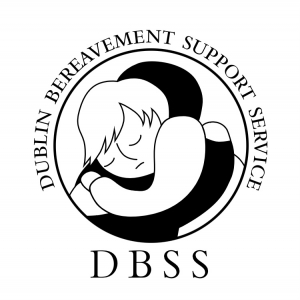
The Dublin Bereavement Support Service (DBSS) was launched by Clontarf Parish. Comprising of a team of trained bereavement counsellors who are volunteering their time and expertise, the service will initially operate via Zoom until such time as it can safely transition to a person-to-person counselling service.
The new DBSS was born out of conversations between the Rector, Rev. Lesley Robinson, and parishioners Jim Kieran and Dr. Tony Walsh, both of whom are experienced bereavement counsellors, focussing on the impact that the pandemic and all the associated restrictions have had on the experience of loss and grief. Not only have many families lost a loved one to Covid-19, most of whom could not be with the dying person in their final days and hours, but everyone who has been bereaved over the course of the last year has been denied many of the supports and rituals which are usually such an important part of the grieving process. All of this is so counter-intuitive and counter cultural in a society like ours which normally puts such emphasis on the rituals around death and bereavement and will no doubt lead to a lot of unprocessed grief around the loss of loved ones. Jim used his network to bring on board a number of trained and experienced counsellors who agreed to be a part of this new venture, and the seed which had been sown began to sprout.
Although the DBSS is run under the auspices of Clontarf Church of Ireland parish, and is rooted in the Christian calling to show love and compassion to all, the service will be offered in an impartial, non-judgemental way which will not seek to impose religious beliefs on others and will acknowledge that people’s experiences of grief may differ, but all are equally valid.
The support service is offered free of charge although donations can be given if desired. Prospective clients can contact the volunteer counsellors directly by accessing the contact details on the DBSS website.
We hope you will avail of this service, and please pass on the information to those who many need it.
Taken from the press release announcing the Dublin Bereavement Support Service
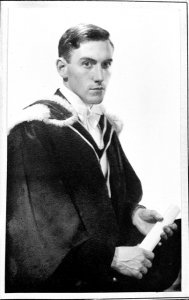
Reverend Canon William Stanley Baird
Warden: Church’s Ministry of Healing Ireland 1971-1979.
Died on June 12th, 2021
Reverend Canon Daniel Nuzum Chairman and the Board of Directors of CMH:Ireland would like to express their sadness on hearing of Stanley’s death and extend their deepest sympathy to Helen and family.
Canon Stanley Baird was appointed Warden of the Church’s Ministry of Ireland in 1971 and had deep commitment to Christ’s Healing Ministry and had significant experience in his ministry across the island of Ireland. Stanley developed an excellent relationship with members of the medical profession and was very involved in hospital ministry. He was respected for his sensitive and pastoral style and was invited to speak at conferences in many countries.
Stanley retired as Warden in 1979 and was appointed Rector of Drumcondra and North Strand and later in Swords. He continued to hold Healing services in these parishes until his retirement.
We give thanks for Stanley’s ministry and his commitment to the ministry of healing and pray that he rests in the love and peace of Christ.
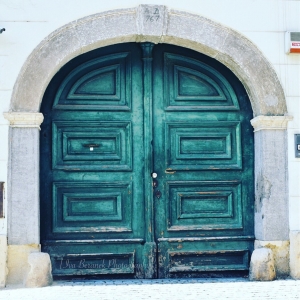
I invite you to pray with Resurrection stories that the Gospel writers tell us about.
Praying with the Resurrection helps us to see its reality in our own lives.
Find a quiet place where you can sit comfortably. Put your feet firmly on the ground, with your back straight.
Know that God is with you.
Allow silence and God’s presence within it to sip into your soul.
In one of the accounts John tells us,
“When it was evening on that day, the first day of the week, and the doors of the house where the disciples had met were locked for fear of the Jews, Jesus came and stood among them and said, ‘Peace be with you.’ After he said this, he showed them his hands and his side. Then the disciples rejoiced when they saw the Lord. Jesus said to them again, ‘Peace be with you. As the Father has sent me, so I send you’. When he had said this, he breathed on them and said to them, ‘Receive the Holy Spirit. If you forgive the sins of any, they are forgiven them; if you retain the sins of any, they are retained’.” (John 20: 19-23)
Read the passage again.
Take 10-15 minutes and pray with it.
What word(s) stand out for you?
If it helps you, be free to close your eyes and imagine yourself in the scene.
Where are you when Jesus walks through a closed door?
How do you feel?
Engage with Jesus. Tell Him how you are.
Listen to what He tells us.
Stay with Jesus for as long as you would like.
When you are ready, finish this time of prayer with the Lord’s prayer.
If the prayer spoke to you, you can repeat it at another time, or choose a different Scripture to pray with.
Easter blessings.
© Dr. Iva Beranek
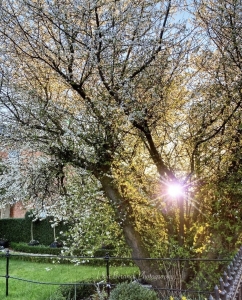
“The sacrifice acceptable to God is a broken spirit; a broken and contrite heart, O God, you will not despise.” Psalm 51: 17
These days many people are struggling. Some struggles are common for we all share the human condition. And yet there are struggles that are unique to each individual, because we cannot know what each person is dealing with, unless they tell us about it. I cannot know what you had to deal with in the past year nor what you had to overcome in order to come to this point. But God does. God knows our hearts.
Normally in Lent we say that we join Jesus in the desert. Having gone through a number of lockdowns since March 2020, and being in lockdown – at least in Ireland – still, the image of a desert may not be as inspiring. We have had our shares of the desert moments throughout the year.
Lent also coincides with Spring in Ireland. It order to burst into bloom, flower-seeds need to rest in the dark of the soil, let go of what they know, and embark on the journey of growth. As they do that, gradually small shoots come out on the surface, and with the support of sunshine, water and nutrients, they grow into beautiful flowers.
Can you notice areas in your life that are undergoing a similar journey?
I like to think of Isaiah 61 as we start Lent,
“The Spirit of the Lord is upon me, because the Lord has anointed me to proclaim good need to the poor. He has sent me….. to comfort all who mourn, and provide for those who grieve in Zion – to bestow on them a crown of beauty instead of ashes, the oil of joy instead of mourning, and a garment of praise instead of a spirit of despair.”
Jesus is the one who has been anointed & who exchanges the difficult realities into those where His glory shines forth. This is especially true for the Holy Week, so when we come to it this year, let us allow Him to bring healing into our lives and to lead us through our difficulties, towards His glory.
Until then, it may be helpful to look at this Lent this way: not that we are joining Jesus in the desert but instead He is joining us in our own deserts. And His presence makes all the difference.
© Dr Iva Beranek
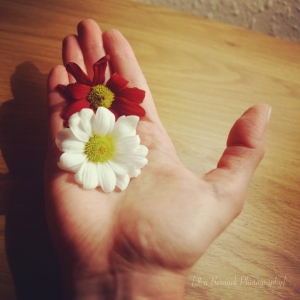
What a time it’s been these past few months of needing to live differently, for our own safety and for that of others. How counter-intuitive it has been having to pull back from family and friends, with some of us having to cocoon or even self-isolate in order to ensure community health and well-being.
We are designed to be relational, both with one another and with our Creator. While some have found the enforced period of slowing down and reduced activity to be refreshing, many have found that the pressures inherent in the sudden adaptations required have increased stress, anxiety and ongoing troubles.
As Christians we sometimes find it difficult to reach out for help, berating ourselves for needing to depend on others since all our hope is founded on God.
How good it is to remember that as our loving Father draws us to himself He reaches us in a myriad of ways. Sometimes He touches us through prayer, the Scriptures, through worship and often through the beauty of nature. Other times He cares for us through the words, deeds, kind gestures or simply coming alongside us of other people when we are experiencing a particular need or difficulty.
‘God is our refuge and strength, an ever-present help in trouble’ (Psalm 46:1) reminds us of His provision. ‘For I am the Lord your God who takes hold of your right hand and says to you, do not fear; I will help you’ (Isaiah 41:13) reassures us of his concern for our wellbeing. Jesus met people where they were at, longing to bring healing and hope into their lives.
One of the many supports available to us in these times is the charity Aware. Aware runs a Support Line 365 days a year, from 10am till 10pm (1800804848). Callers receive support and information about coping with stress, anxiety, depression or bipolar disorder. All calls are confidential within normal limits. A range of beneficial resources and programmes are available through www.aware.ie.
It may take courage to ask for help, but when we do it, we are grateful for taking that step.
Prayer is life-giving and also not always easy. God is not ‘socially distant’ so one might think that prayer is to be the same at the time of lockdown, as it was before or as it will be after. But when life changes, often prayer changes as well.
Any authentic prayer will reflect what is going in our life, too.
Over the last number of months we have had to quickly adapt to an online experience of communal worship. Prayer meetings and church services all moved from in-person gatherings to online. While this provided continuity in praying together in a new format, it may have also been overwhelming to a degree. All human interaction moved to online encounters. Now with the easing of restrictions and being able to go to church again, this new phase will bring much needed comfort to some, and will prove to be an additional challenge to others.
If your prayer changed over the last months, or you found it hard to pray, don’t judge yourself for it.
If your prayer carried you through, be grateful. Thank God for it.
If it was somewhere in-between, know you are human and God loves you as you are.
Experiences of fertile valleys and of deserts are both very common in life and in prayer. If you experienced any combination of these during the months of lockdown – take heart.
Where did you find God over the last few months?
For me He seeped into my alone time in the house, like sap drips from the tree giving it life.
“Sap carries important nutrients, water and hormones through the tree that are essential for a healthy plant.” We may judge it as sticky or unpleasant, but for trees it is essential. Trees drip more sap when damaged, when attacked by pests or diseases. At the times of difficulty, perhaps God drips more sap into our lives, by being near through His grace, mercy, love.
What kind of sap did God drip in your life?
Having to incorporate social distancing in our every-day life for now is not natural. Handshake, a hug when meeting a friend, instead of providing human connection have become ‘dangerous’. And yet, we still need them. Grieving these changes will hit some of us harder than others, but allow yourself to grieve if you need to. Bring exactly how you feel to prayer, be real with God in communal worship, in your alone times. Notice what you are grateful for, and where you need healing.
May God drip his healing oil into all aspects of your life. In Isaiah God promises us “the oil of gladness instead of mourning, the mantle of praise instead of a faint spirit” (Isaiah 61:3).
May it be so for us today. Amen
Iva Beranek
Dr Iva Beranek is the Ministry Facilitator for the CMH: Ireland